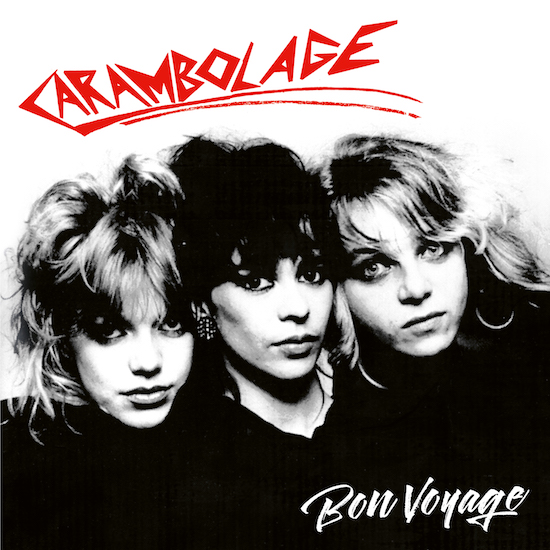Carambolage by Achim Loeppke
This is not so much a review as the story of a creative transfer that links to another lost and wider tale of how people used to, up to very recently, make art. It feels strange to relate nowadays but not so long ago, glittering and prosperous cities such as Amsterdam, Zurich, Berlin and Hamburg were cheap and radical places where “punk” anti-establishment individualism crashed into, and sometimes found common ground with hippyish ideas of back-to-basics living. City and urban-based squats and alternative groups were a magnetic energy source for those looking to express themselves; certainly in the antsy, paranoid 1970s and 1980s. Common points of unity were anti-nuclear, anti-military, anti-corporate and gay liberation politics and a loathing for MOR “symphonic” rock. Doing it yourself with other (not always like-minded) drop outs could be difficult. Here though, we have a happy tale of one energy source propelling another.
It is initially the story of three women who were involved to varying degrees with Berlin’s revered anti-capitalist and German-language rock band, Ton Steine Scherben (roughly translated as ‘Clay Stones Shards’ though the name has many other meanings). Drummer Britta Neander, who had played with “Die Scherben” since the mid seventies, set up a new act called Carambolage, with Scherben guitarist R.P.S. Lanrue’s sister, Elfie-Esther Lanrue. Angie, a “street kid” who joined the Scherben commune in 1972, completed the original line-up which created the fizzing self-titled debut in 1980. Two years later the band recruited reed player Janett Lemmen and made the album Eilzustellung-Exprès, a record this writer considers a masterpiece of left-leaning pop music. These releases were followed by 1984’s polished endpoint, Bon Voyage, which saw Manne Praeker join the fold.
Ton Steine Scherben had projected themselves as a passionate and rabble-rousing street gang whose singer Rio Reiser played out the role of “rebel with a heart of gold” in his lyrics. Their music has an emotional sweep to it that isn’t that far stylistically from Bruce Springsteen or Herman Brood. In line with being openly left-of-centre, the band concerned itself with the politics of squatting, social change, and gay liberation. It should come as no surprise that – like many of their European musical and social peers – Ton Steine Scherben released records through their own label, David Volksmund Produktion (the David taken from the David and Goliath myth and volksmund meaning ‘the people’s voice’). Many of the releases understandably reflected their socio-political concerns, and it would have been unthinkable given existing personal and political ties if Carambolage’s records had not been brought out on the imprint.
Listening to Carambolage’s music feels like discovering an overlooked thread found on the floor of rock & roll’s labyrinthine history. The whole experience has been utterly refreshing; akin to taking a long draft from a hidden, clear running stream. Getting to know the debut, Bon Voyage, and Eilzustellung-Exprès is not so much a pleasure of joining the dots in retrospect as revelling in the thought of creative people from diverse backgrounds picking up certain ideas, feelings or socio-cultural frustrations and running with them. And hearing echoes and re-workings – often surely unwitting ones – from decades later. It’s the sort of reflection that gives me hope for humanity.

The debut, Carambolage, is a skittish affair; the sound of a band drunk on their own potential, one that finds Neander and co. trying on a variety of attitudes and almost immediately discarding them as if they were clothes on a sale rack. At times you could describe the record as an animated conversation with loud guitars and drums and tacky synths butting in (their name, after all, means a collision or car crash). Fittingly, the band parades its work as a peculiar, rough-hewn beauty, without any hint of remorse. Tracks like ‘City Grossmarkt’, ‘Das Maennline’ and ‘Tu Doch Nicht So’ veer unsteadily (sometimes in a very arch manner) between cabaret and a seedy working men’s club sound. The music here really is redolent of sticky carpets and stand-offs in the toilets. As a whole, the debut is never less than entertaining, even if the music often plays second fiddle to the personality of singer Elfie-Esther Lanrue, who knocks out a righteous set of sneering mini-dramas to anyone who will take notice. This is people’s theatre: even when there seems to be a moment to collect one’s breath, matters are kept simmering for the next act. Listen, for instance, to the almost instant tension created between the impassioned yowlings and slightly atonal strum on ‘Je T’aime’. Or that track’s not-so distant cousin, the greasy, sleazy and altogether queasy ‘Roxan’. Then there is the almost slovenly ‘Der Reigen’, which does its best to seduce but ends up crawling around in a circle on the floor. It is a powerful record, driven by guts, honesty and a sky-high attitude.
As posited before, Eilzustellung-Exprès is a masterpiece of alternative pop music, where Carambolage’s vision starts to take real shape. The record’s pace never flags and it has personality in sackfuls, but it never feels manufactured to make a point. Rather, we experience that rarest of sensations, the feeling that each song on the album follows its natural predecessor, and that no other song pairing could have fitted, at any time. This natural sense of progression (surely some strange human afterglow of the recording process), creates a wonderful and magical document, one that allows the listener to sit back and slowly radiate. I dread to think what soulless cold porridge Sp*tify could make of the record. Please, don’t listen to it in such a way. You will really miss out on something that has waited forty years to be heard, succumbing to some form of emotional cannibalism.

The record starts with ‘Vollgeturnt’ a chirpy take on 60s pop, replete with a rocking strut and echoes of doo wop in the backing vocals. It is sturdy, timeless music that draws on rock’s array of sweetmeats. With second track ‘Eingeschneit’, the guitars slip and slide around the organ, which makes an attempt to act as a compass reference for the melody line. Their trademark looseness is infectious: the cajoling voices are tighter than on their debut but still have that chatty, gossipy quality to them. There are echoes of Slits and Au Pairs, and fabulous current bands like Vilnius’s shishi here, too. The spirit of Nina Hagen pops up in Elfie-Esther Lanrue’s expressive vocal delivery in ‘Widerlich’; not a huge surprise given German alternative pop music of the period always seemed to have one eye on the theatre stage and another on the street. Once again the guitars create their own mess, like a bunch of toddlers ripping up a birthday cake. ‘Warum’ also has a smear of greasepaint clinging to it, and the dramatic piano part is reminiscent of Nicolle Meyer’s fabulous 1983 single, ‘Nowhere Bei Mir’.
The tracks on this record have an irresistible fizz and crackle. They are very much of their time, and reminiscent of many of their peers, yet still full of cuts that sound utterly fresh. Carambolage seemingly swallow each genre whole, carried away with the prospect of making music in the moment; the four women rewriting the past for their own purposes. ‘Die Zeit’, with its wide open spaces, taut rhythms and laconic sax drone even reminds me of Australia’s Laughing Clowns. Maybe these mnemonics are evidence how a sound or feeling could get around the world unseen before theorising got its boots on. For its part, ‘Gehirnwäsche’ is a glorious knees up that beckons the wallflower to make gawky shapes on the dancefloor. The ska elements and jaunty melody and the call-and-answer vocals combine to create something very familiar: I may be projecting the chemtrails of my own brain onto this but maybe this is a post punk take on The Monks? Surely they couldn’t have known it at the time; who cares? Then there is the glorious ‘Was Ist Das’, a beautiful pop track concerned with the “waarheid”, that wraps itself around a slurping keyboard riff and some sensual “Sternenmädchen” vocals which at one point tell us, “Ich bin fertig mit der Welt”. Yet this track is busting with life and cheek. It is pure magic.
With Eilzustellung-Exprès, Carambolage sometimes act like gung-ho cooks making a Thai soup, using all the ingredients at once and trusting their properties to blend over time. ‘Psychoeintopf’ is a funny, spunky dialogue backed up by a classic rockist guitar line. It shouldn’t work at all but it does and in doing so it conjures up the spirit of mid-00s releases from the likes of Chicks On Speed. Other chance meetings can be heard courtesy of the hum of the keyboards and the tippety-tappety drums during the long and trippy ‘Lisa’ (a paean to Angie’s newborn child, who may volunteer a squeak at one point). It could be a Stereolab work out, and is there a little bit of Manuel Göttsching’s choppy, bluesy guitar style here? Did some head from the Tom Steine collective ever turn them on to Ash Ra Tempel or Cosmic Jokers? Imagine the scenes. The beautiful, wistful closer, ‘I Remember You’ also keeps the joker spirit alive though we are made aware that this is the closing moment. Clever, engaged and cocksure, Eilzustellung-Exprès is one of those glorious records that spans time and provides new insight to the listener.
Following this highpoint came what turned out to be the band’s final long player, Bon Voyage. This record was recorded in 1984 (with various guest musicians) in the Mad-Mix studios in Berlin, base of former Spliff bass player and Nina Hagen’s producer, Manne Praeker. Bon Voyage is a record full of intent; the strident opener ‘Auf Der Suche’ has something of the choppy funk found in the Bunnymen’s ‘Never Stop’ about it (the arrangement is certainly tipping that way). And the glossier production and more astute synth passages, for example, certainly speak of a band looking to make a ‘proper record’. To an extent Carambolage succeeded: certainly this is quirky chart music that has more than a little of Nina Hagen and Lizzy Mercier-Descloux, and maybe a smidgeon of Propaganda’s ambitious dreamworld. But it’s Carambolage, so any attempt at “straight” pop music soon founders on the rocks of their own committed, uncompromising, squat-bred attitudes.

Maybe that was the problem. Wilfully chucking all ingredients in the pot and hoping attitude would hold everything together was increasingly frowned upon in the slick and cocksure mid-80s. Tracks like ‘La Vie D Amour’ and ‘Kuess mich’, however winning, and however hard the band tries to iron out the creases, can never be standard pop songs that can woo the masses, there is still too much sand in the vaseline. In that respect Bon Voyage reminds me of a record like Orange Juice’s The Third Album, or an early Go Betweens record, a folio of gloriously crafted and intelligent songs that somehow still sounds leftfield and awkward to some ears. Now and again we get tracks that start to probe in other directions, such as ‘Herrscherin’ or ‘Schnuckelbaby’ which sound slightly sinister. Overall, Bon Voyage can be an oddly disjointed listen. Shortly after the record was released the band foundered to a stop, claiming artistic differences.
The story of Carambolage is to some extent both a story of what might have been, and another footnote in the story of alternative western pop music of the 1980s, where creative ambition and negotiations with mainstream mores often couldn’t make peace with principles and resistance narratives forged in punk and other alternative forms of living. But now, still, after all these years, we have these three records; the legacy of a spirited and independent band who had something to say and could, however fleetingly, lighten up the world when saying it.
Carambolage, Eilzustellung-Exprès and Bon Voyage are out today


